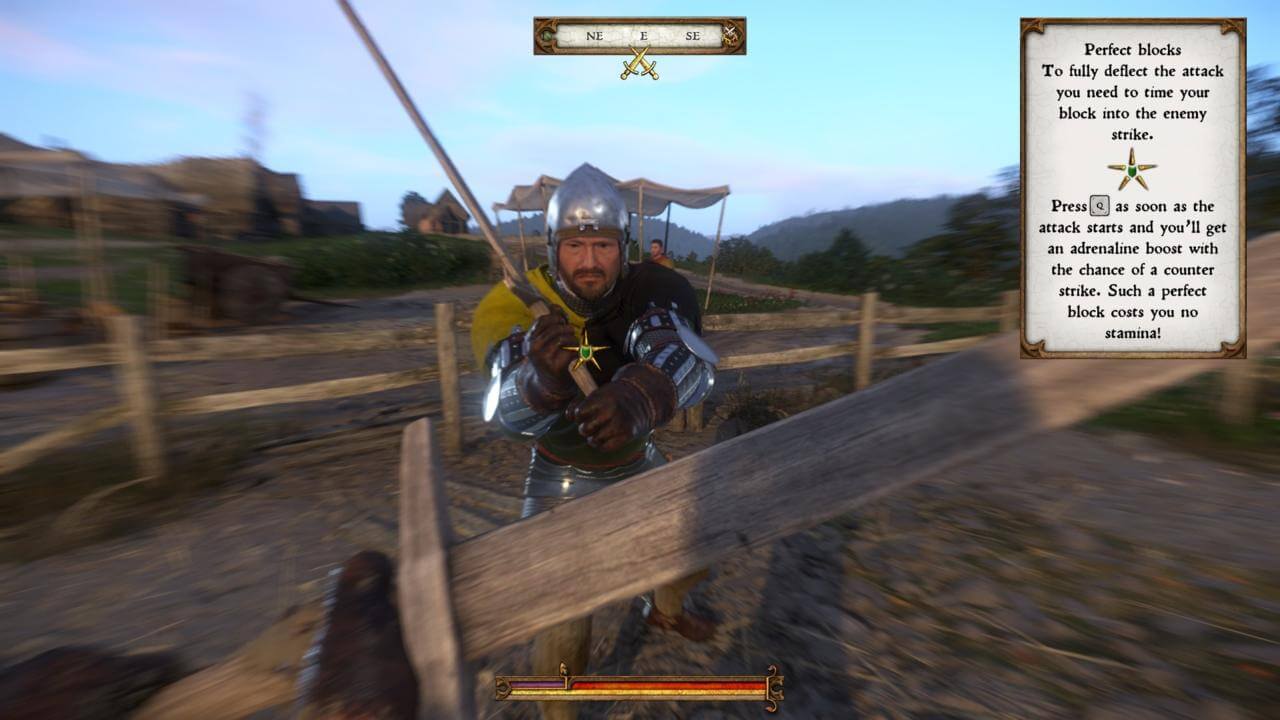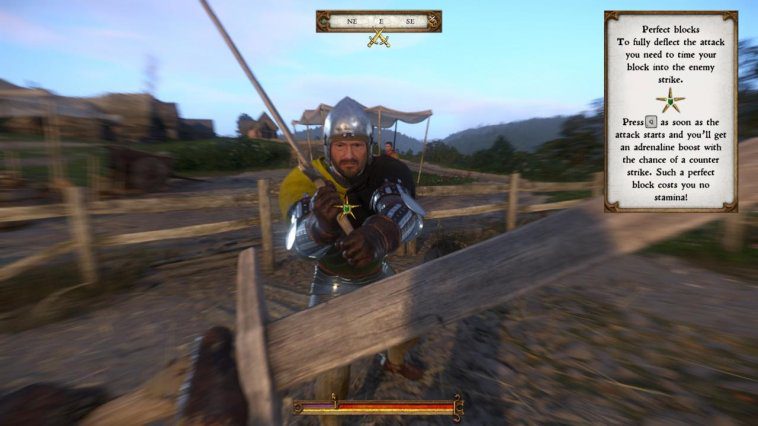No matter how much a textbook, TV show, or video game strives to depict the reality of what life was like in ages past, the end result is usually sanitized. The medieval era is a great case in point. Think of this long-ago time today and you imagine noble knights, maidens fair, and fat kings waving around legs of lamb. In truth, the period was more about robbers knifing you in the streets, wenches plying their trade, and lords working you to death on their manors.
Kingdom Come: Deliverance is dirty. Filthy, in fact. This expansive RPG from indie developer Warhorse Studios ditches cliches for a brutal portrayal of the Middle Ages that wastes no time proving how difficult life was in the early 15th century. Every romanticized notion of the era is extinguished through storytelling and a setting that captures the unfairness of existing when life expectancy hovered around 30 years–if you were lucky. Aspects of the game can be a little too unforgiving even for this vicious era due to some overly exacting mechanics and a host of oversights that includes a torturous save system, but Kingdom Come: Deliverance is still a rewarding, one-of-a-kind game.
Granted, it delves into a part of history you probably know little if anything about. You play as Henry, the naive son of a blacksmith who has the misfortune of living in Skalitz, Bohemia in 1403, when the countryside erupted with violence due to the imprisonment of the rightful King Wenceslaus IV by his power-hungry brother Sigismund. After a pastoral medieval day of hitting on the local barmaid, playing pranks, and helping dad finish a sword for the local lord, your village is attacked by an army without warning. Faced with savage marauders, all Henry can do is watch in terror before fleeing for his life.











All of this adds up to a terrifying opening that serves as both a spectacular source of frustration (expect to die many times before successfully escaping Skalitz) and as a warning that Kingdom Come: Deliverance is not a typical fantasy RPG. There’s no heroic swordplay here, no wizards casting fireballs, no clerics raising the dead, no orcs or dragons. This is the story of an actual civil war that raged across Bohemia in the first decade of the 15th century. Your part in it is that of a nobody struggling to survive in a land full of noblemen who couldn’t care less if you lived or died, and fellow peasants who would stab you in the back for a crust of bread.
Such a cruel atmosphere is actually what makes Kingdom Come: Deliverance so enthralling, supported by an incredible attention to detail. Built in CryEngine 3, the presentation brings the era to life, from the filth of muddy village streets to idyllic sylvan forests where you can hunt wild boar or relax while sunbeams and butterflies sparkle around you. Character faces are diverse, as are their costumes, which appear textbook-authentic whether you are looking at a nobleman in hose and puffy sleeves or a guardsman wearing a steel hat and a leather jerkin. The layering of armor results in some visual clipping and details being filled in abruptly as you approach NPCs, but these little blemishes are easily overlooked when you’re immersed in the events occurring around you.
Voice acting and scripting is nicely evocative of the age, right down to the constant religious references that underline the importance of Christianity. There are some flaws here, most notably in the load times needed to start dialogue and the sometimes repetitive conversation options, but all of the important dialogue is presented brilliantly.
Looking after your clothing and taking semi-regular baths is also vital. Shown up at a lord’s manor house in rags stinking of the stable? Good luck if you have to ask a favor. Conversely, wandering around taverns wearing a shirt adorned with someone else’s blood can make you more fearsome. Almost every action here has a consequence.
Other dialogue idiosyncrasies include anachronistic modern swearing along with accents from seemingly every corner of the globe (many actors voicing the main characters hail from the U.K., but you encounter others with American and other inflections). Still, while this language creativity can be a little jarring, it mostly fits. Even the music contributes strongly to the mood, with such strong plucked strings and flutes that you almost expect Ian Anderson and the rest of Jethro Tull to prance out of the woods on occasion.
A codex actually tracks everything you discover during Henry’s adventures. These entries eventually turn into something of a medieval encyclopedia. Lengthy sections reveal extensive details about the struggle between Wenceslaus IV and Sigismund, the feudal system, hygiene, liturgy, prostitution, toilets, and much more. So if you want to find out more about the Western Schism in the Roman Catholic Church but don’t want to crack a textbook, this is your game.
Game systems further prop up the ambiance provided by the game’s look, sound, and historical detail. Characters start work when the sun rises and head to bed when it sets. You must fit into this schedule, which also involves regular food and sleep to stay healthy and hearty. Time skips are possible, although even then you still have to wait a minute or two while the hours slowly tick by. Looking after your clothing and taking semi-regular baths is also vital. Shown up at a lord’s manor house in rags stinking of the stable? Good luck if you have to ask a favor. Conversely, wandering around taverns wearing a shirt adorned with someone else’s blood can make you more fearsome. Almost every action here has a consequence.
While an extensive statistic-and-skill system provides you with a tremendous number of ways to customize Henry as he explores 15th-century Bohemia, he’s only as good as his collective experiences. So if you want to get better at firing a bow, you need to practice at the archery range or head into the forest and shoot wild game like rabbits. Want to buff your skills with a sword or mace? You need to head to the training yard or into the countryside to look for bandits and enemy soldiers.
With that said, you still level up, track four primary stats, and follow 17 skills that impact specific activities. Dozens of selectable perks attached to the individual skill categories afford even greater fine-tuning, in that you can pick all sorts of personality traits that govern everything from how much beer you can drink to how well you can stay on a horse, to improving charisma and speech through the power of literacy. There are no shortage of options when it comes to turning Henry into a wannabe noble and a scholar (or a thug and a thief).
Combat and movement controls also run true to the focus on realism. Instead of instantly turning into a warrior when you whip out a sword for the first time, Henry is a klutz at the start. You throw punches or swing a weapon with mouse or analog stick motions to dictate an attack trajectory. Ranged battles are similarly tough, due to a lack of a targeting reticle for your bow. Increasing stats and skills allow your combat abilities to gradually improve over time, but it doesn’t seem that you can get anywhere close to the effortless abilities typically displayed in RPGs. Other actions such as riding a horse and picking locks can also be overly finickly. Yet as much as such activities can result in frustration (especially at the start of the game), the rigorous control scheme underlines the central theme that adventuring is not supposed to be easy for a village peasant with no experience of the wider world.
Progress is saved automatically after you sleep and at certain moments of play, but you can’t just sleep anywhere and saves aren’t made regularly enough during quests. And since you can get killed so easily here, you always feel at risk of losing time and momentum.
As a result, fighting has a steep learning curve. But it is one well worth scaling. Every battle in the game is nerve-wracking. The cold fact that you are not a majestic fantasy warrior means that you can be killed at any time. Taking on more than one opponent is incredibly risky, and engaging with three or more is simply futile. Armor adds a layer of tactical complexity, too. The game features a thorough suite of medieval armor and clothing options ranging from padded shirts to plate, but wearing it weighs you down and can block your vision (put on a full helmet and you see the world through a slit). Battling foes in armor also presents its own challenges. Take on a fully equipped enemy and you need to either target their openings with arrows, or switch to blunt weapons better at bashing metal-covered heads and shoulders than anything with an edge.
Despite these complexities, it’s disappointing that combat lacks physicality. It’s clumsy enough that you never feel completely in control (although much of this is certainly intentional, to best depict Henry’s rookie status when it comes to waging war), and there are odd hesitations in the animation that remove you from the immediacy of battles. Melee scraps are rough-and-tumble brawls for the most part, where you try to beat the enemy down before you collapse of wounds or exhaustion. That said, you’re generally so grateful just to survive that you don’t care how good your victory looked.
Even though Kingdom Come: Deliverance is built similarly to a standard RPG like Skyrim, where you accept quests and follow map icons to their destinations, there are some key differences. The biggest is the way that adventures are built around the living world. So if you’re told to meet a nobleman at dawn, you better do it or he may well take off without you. This has some tremendous benefits. You really feel like you’re inhabiting a real world that continues on without you. Quests also nicely blend mundane medieval duties like hunting rabbits for food and taking on guard patrols with more involving jaunts like investigating a murder, partying with a priest, tripping with witches, and tracking down the bad guys to get some vengeance and earn respect from nobility.
Still, this approach makes for a lot of dicey moments. The game feels like a balancing act where everything could spin out of control at any moment if you miss a scheduled appointment to start a quest, or even worse, encounter a bug. Bugs sometimes prevent characters from appearing when they should, making you revisit locations to trigger quests, or revisiting old saves to get things back on track. Key characters and locations are also often not given precise locations. This adds to the sense of being a real person in a medieval landscape and not a gamer following an icon on a compass, but it also forces you to take on impromptu scavenger hunts and wander aimlessly through the extremely dangerous wilderness, where you can easily stumble into an enemy encampment or even an ambush staged by robbers.
Being able to save your location anywhere and at any time would have helped a lot of the above problems, but this isn’t an option. Progress is saved automatically after you sleep and at certain moments of play, but you can’t just sleep anywhere and saves aren’t made regularly enough during quests. And since you can get killed so easily here, you always feel at risk of losing time and momentum. You can save manually with the use of “Saviour Schnapps,” but this concoction has to be purchased at a high cost (tough to manage early in the game) or brewed. Modders have already stepped in with a fix that adds the ability to save on demand on PC, although the developers need to officially add this feature (or at least a save-on-exit feature in case real life gets in the way and you need to stop playing the game quickly).Basically, the game needs a patch along with a fresh look at saving and a few other design elements to let its better qualities shine.
Even with these issues in mind, anyone who can appreciate the down-and-dirty nature of history should play Kingdom Come: Deliverance. It’s an impressive and unflinching look at the medieval era that transports you inside the compelling story of a real person caught in the middle of a civil war. As such, this is one of those rare, memorable games that stays with you long after you stop playing. While quirks and bugs can certainly be frustrating, none of these issues interfere much with the unique and captivating nature of the overall experience.
Website: LINK


